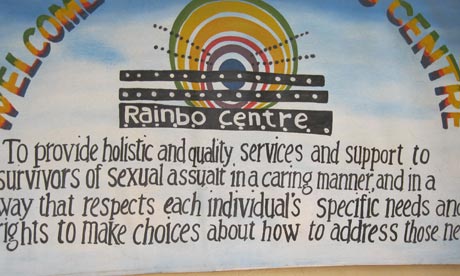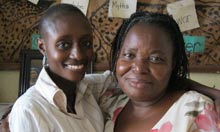The Politics of Land Grabbing; Strategies of Resistance
Centre for Peace and Development Studies, University of Limerick
4-5 June
Land Grabbing, Economic Development and Human Rights in Sierra Leone –
A case study
Dr Seán Farren
Sierra Leone Ireland Partnership
www.slip.ie
Contact: sean@slip.ie
Introduction
Sierra Leone, the sub-Sahara country with which Ireland has had the longest historical connections, emerged from a bitter conflict some ten years ago. Thousands lost their lives, many more were injured and horribly maimed, infrastructure destroyed and the country’s economic and social development seriouSierra Leoney retarded. Not surprisingly, the country finds itself close to the bottom of every index of development ad is very anxious to expedite economic development in order to eliminate extreme poverty. It is in this context that the issue of large scale land acquisitions has to be considered.
This paper explores Sierra Leone’s experience of land acquisitions against the backdrop of the state’s efforts to stimulate the economy. Among the issues raised are the displacement of local communities, the challenge to their rights, the replacement of food crops by crops such as sugar cane and oil palm, base ingredients in the production of bio-fuels, and the threat posed to the environment by the scale of these investments.
Attracting Investment
Since the conflict ended Sierra Leone has shown a remarkable degree of political stability. Three general elections have taken place in relatively peaceful circumstances, one resulting in a change of the ruling party. In addition, there are positive signs of an economic recovery, particularly as far as restoring and developing infrastructure, the redevelopment of pre-existing extractive industry enterprises and opening of new enterprises. The prospect of off-shore oil is also attracting investment interests. With considerable international assistance, investment in health services, particularly in maternal care, is bearing positive results while in education progress towards achieving the goal of universal primary schooling is steady while second and third level have also seen progress in recent years.
It is not surprising that Sierra Leone like many developing countries anxious to reduce budget dependency on foreign aid, has adopted investment policies which include targeting overseas enterprises, offering generous allowances, no or low taxation on profits coupled with the expatriation of profits and support with start up costs where that is necessary.
Much of the Sierra Leone government’s effort in attracting such investment has focused on multi-national agri-businesses eager to invest in opportunities to develop cash crops like sugar cane and oil palm and in food crops like rice mainly for export. In this regard Sierra Leone is no different from other sub-Saharan countries to which multi-nationals in the agri-business have been attracted to make similar investments.
The Sierra Leone Investment and Export Promotion Agency (SLIEPA), which encourages foreign investment claims there is an abundance of uncultivated soil rich land available in the country with a plentiful supply of water. The agency stresses the opportunities for the production of ethanol from sugarcane and bio-diesel from oil palm and points to Sierra Leone’s proximity to Europe where the EU wants to significantly increase the use of bio-fuels in transport.
Regarding land tenure SLIEPA states that land is considered a heritage, to be preserved and handed down to future generations. The agency explains that the tenure system is communal and that ‘The Chiefdom Council, headed by the Paramount Chief, is regarded as the custodian of the land on behalf of the entire Chiefdom but decisions regarding land are taken in consultation with heads of the various land owning families’. However, the agency also states that ‘strong government facilitation makes land easy to obtain in most agricultural areas through secure, long-term leases’.
The SLIEPA document goes on to provide detailed guidance on how companies can acquire leases on land where they would wish to cultivate particular crops. SLIEPA has already indentified areas which would be suitable for the cultivation of particular crops and offers its services to interested companies. Among the guidelines local consultation is stressed as being an extremely important part of the process. According to SLIEPA ‘strong engagement at Chiefdom level is key, paying particular attention to land owners’. Companies are also advised to conduct an Environmental, Social and Health Impact Assessment (ESHIA) and to ‘secure the free, prior, informed consent of affected communities, not limited to only Chiefs or other representatives’.
It would appear, therefore, that the government goes along way towards respecting local rights and on the kind of advice potential investors should follow
Scale of the Acquisitions
In Sierra Leone over 1m hectares (ha) or over 20% of all arable land, have now been acquired by foreign companies coming from countries such as Belgium, China, Germany, India, Iran, Malaysia, Nigeria, Portugal, UK, USA and Vietnam. Two of these companies are SOCFIN and Addax and a brief word on their acquisitions and on their declared policies.
According to SOCFIN (SL) the company secured, in 2011, 6,500 ha of prime farmland for rubber and oil palm plantations in Malen chiefdom in Pujehun District of Sierra Leone. The firm is now seeking an additional 5,000 ha in expansion plans in the Malen or neighbouring chiefdoms. The initial investment, estimated at $100 million, with promises of job creation, compensation for lost farms, and construction of infrastructures, has enjoyed high-level government support. It is not the only company acquiring land in this area. In total 9000 ha have been acquired by large agri-companies.
SOCFIN claims that one of the most effective ways to help support sustainable development is by doing business in a socially aware and responsible manner, helping to create and share wealth, invest in local economies, develop people’s skills and spread expertise across borders. SOCFIN firmly believes in an environmentally responsible management and cares about its social responsibilities.
The SOCFIN group is also a founding member of RSPO (the Roundtable on Sustainable Palm Oil), which aims to promote the production, procurement and use of sustainable palm oil by means of compliance to RSPO principles & criteria:
1. Commitment to transparency
2. Compliance with applicable laws and regulations
3. Commitment to long-term economic and financial viability
4. Use of appropriate best practices by growers and millers
5. Environmental responsibility and conservation of natural resources and biodiversity
6. Responsible consideration of employees and individuals and communities affected by growers and mills.
7. Responsible development of new plantings
8. Commitment to continuous improvement in key areas of activity.
ADDAX
Addax Bioenergy is a division of the Swiss-based energy corporation Addax & Oryx Group (AOG), created in 2007. In Sierra Leone, the Addax Bioenergy project will produce sugarcane on 20,000 ha for ethanol production, to be exported to the European Union. Addax benefits from a duty-free access to Europe through an Economic Partnership Agreement. The sugarcane by-products will be used to generate about 15 megawatts (MW) of excess power, which will be fed into Sierra Leone’s national grid.
The Addax land lease is for 50 years, with a possible extension of 21 years. Rents from the annual rental fee of USD 12 per ha are to be divided among landowners (50 percent), Chiefdom Councils (20 percent), District,Council (20 percent) and the national government (10 percent), in accordance with the MAFFS policy document on lease payments and distributions.
Employment figures vary according to the source. The MOU states that in the first phase of production (2010-2013) the project will employ an estimated 3,000 people, increasing to 4,000 in phase two of production (2013-2015).161 The Addax website states that the project will provide more than 2,000 “direct jobs,” without defining what a “direct job” entails, whether permanent or seasonal. The Environmental, Social and Health Impact Assessment (ESHIA) for the project said Addax would employ approximately 2,200 permanent and 2,500 seasonal workers, locally recruited, ot quite the 3000 promised.
Critical Views
As is now well known, such investments have attracted considerable criticism. The recently published 2012 Global Hunger Index report lists the ‘scrambles to invest in farmland around the world’ along with drought, shifts in energy prices, and shocks in energy supplies as factors underlying the scarcity of resources we depend on to produce the world’s food supply and points to Sierra Leone to make its case.
The main Sierra Leone based NGO with an interest in the land acquisition issue is Green Scenery while one of the main international voices raised to question the manner in which investment in land is being encouraged and developed is the Oakland Institute based in California, USA. More recently Concern Worldwide in conjunction with Welthungerhilfe and the International Food Policy Institute have highlighted land acquisitions in Sierra Leone.
Green Scenery’s vision is to empower the Sierra Leonean people to work towards peace and development, with equitable access to the country’s resources, equal access to facilities and opportunities, while upholding respect for human dignity and protecting the environment. To these ends Green Scenery supports local communities whose resources are threatened and lobbies government, parliament and public authorities on environment and justice issues.
The Oakland Institute has a worldwide remit ‘to increase public participation and promote fair debate on critical social, economic and environmental issues in both national and international forums’. The institute has published several reports on land acquisition in Sub-Saharan Africa and elsewhere. Included in those are reports on the situation in Sierra Leone.
The Oakland Institute has raised concerns about land acquisition in Sierra Leone. Together with Green Scenery, the Institute challenges the claim by SLIEPA, frequently repeated by Government Ministers, that the country has vast areas of “available,” “unused,” or “under-utilized” land. However, according to the Institute, it is unclear what is meant by these terms and whether Sierra Leone’s “cultivatable” land is, in fact, used or unused.
The Institute claims that there is no reliable data to show how much of the country’s land is actually under cultivation and indeed how much is required to meet Sierra Leone’s food needs. Its reports also claim that there is ‘a lack of transparency and public disclosure’ surrounding land deals. The Institute claims that ‘Land leases are negotiated directly with chiefs and landowners, and often the signatories do not have copies nor are they aware of the terms of the leases or even the land area covered. As a result, there is little critical or accurate media coverage of the land deals, Sierra Leoneans don’t know how much of their farmland has already been leased to foreign investors, and there is no serious public debate on the subject.
The Oakland Institute further claims that its studies have revealed that ‘Foreign investors often employ local “agents” or “coordinators” to identify land for lease and negotiate leases with local communities, chiefs, and landowners. There is evidence that these “agents” take unfair advantage of local traditions, perceptions and vulnerabilities in order to convince local populations that they will benefit from the lease deals, while refraining from discussing potential risks such as loss of farmland or negative environmental impacts.
The Institute points out that ‘The Government of Sierra Leone provides myriad financial incentives to encourage foreign investment. General fiscal incentives include a 10-year tax holiday on agricultural investments, a 100 percent foreign ownership in all sectors, which require no restrictions on expatriate employees and also permit full repatriation of profits’. Set these costs alongside the very dubious benefits of bio-fuels and the environmental threats posed by production methods, and huge question marks arise over the whole land use policy.
Regarding the regulatory framework for the negotiation of land investments the Oakland Institute and Green Scenery claim it is ‘extremely weak’. Oakland argues that ‘the policy guidelines and incentives for investors, developed by the Ministry of Agriculture, Forestry and Food Security (MAFFS), contain a number of loopholes, and appear to be non-binding. Without the establishment of an MOU, the government and people of Sierra Leone are vulnerable to environmental degradation and loss of local rights to land’.
Furthermore, according to the Institute ‘there is confusion surrounding the purported “availability” of cultivable land: the oft-quoted notion that 85 percent of arable land in Sierra Leone is available to investors appears to be based on outdated surveys, conducted over thirty years ago, as no recent land survey documents have been identified’.
The 2012 Global Hunger Index highlights the fact that local communities appear to have been misled Sierra Leone about the nature of some land deals. In the Malen Chiefdom the investment ‘was presented as a far smaller deal than was actually the case. Local landowners were informed only after the decision had been made by the tribal authorities and were told to thumb print or sign without knowing or understanding the details of the agreement. Indeed, it was a full three months after the contract had been signed that it was fully read out publicly with ad hoc translation into the local language’.
Protests
Despite political backing, the SOCFIN (SL) investment has faced significant resistance from the local population. In October 2011, 40 protesters were arrested, following tensions between local villagers and SOCFIN. The locals were protesting the land deal, criticizing the company’s lack of transparency, proper consultation, and information regarding potential resettlement. Protesters also raised issues of inadequate compensation, corruption, and pressure on land owners and town chiefs to sign agreements.
Assertions that the land acquired by Addax was degraded are firmly denied by local farming communities. An elder of the community in Lungi Acre commented that, “It’s a big lie. It’s nonsense . . . it’s here we used to get the most rice to service the whole place . . . This place is called Lungi Acre because of its rich productive capacity, and we schooled all our children from the [rice we grew].”
The claims about degradation have also been refuted by an agricultural extension officer who worked in the lease area before the project began. The officer stated that many farmers and many women’s farmer groups earned their livelihoods from the land, cultivating rice, cassava, and vegetables. They used no fertilizers and farmed “organic” produce because the land was “rich and fertile.”
The Addax website also states, “Presently, only small parts of the project area are used for food production.” It explains that a land use analysis of the site concluded that the most valuable food-producing areas on the site are the permanent rice paddies, located in land depressions. The website then states, “Addax has designed its plantation to get around the rice paddies, which will continue to be farmed and accessible by the local population”.
However, contradicting this assertion is the company’s own ESHIA document, which states that Addax will utilise a significant portion of land which was previously cultivated for staple foods such as rice and cassava for oil palm. It warns about the negative impact on food security through an increase in food prices or decrease in food availability for the local population.
Underlying these claims and counter-claims is the issue of the rights of local communities, establishing what those rights are in practice and how they can be vindicated. As Joseph Rahall of Green Scenery states, because of a lack of clarity, ‘the communities are losing far more than anyone else. They lose their land, their livelihoods and they become insecure in food as well as prone to health impacts from the operations of the companies’. Against the combined determination of the government to encourage large-scale agri-businesses to invest, and of the latter to maximize profits, traditional farming communities have little muscle.
Ireland’s Position
As a member state Ireland has supported the EU’s bio-fuel policy, although that seems to be changing, but as a donor country to Sierra Leone Ireland also has an obligation to ensure that its support is not used to the detriment of the people of Sierra Leone, whether this be through land acquisitions that have negative social effects because local people are displaced, or because land is taken out of food production, or because inadequate compensation is paid to those displaced. On the contrary as far as it lies within its capacity the Irish Government should use its influence to ensure that people’s rights are upheld, that food production is sustained and that the environment is fully protected. It should also ensure that small-holder commercialisation schemes, which Irish Aid supports, are developed to their utmost, such schemes having prove their positive effects elsewhere. Above all it should use its influence at EU and UN levels to the same ends.
In conclusion, while everyone is in favour of development and economic growth, given Sierra Leone’s current challenges it is imperative that development be sustainable and equitable. However, it is highly questionable whether the land deals referred to in this paper are being implemented with these criteria in mind. More worrying is the fact that if current approaches are maintained the elites in Sierra Leone who support these investments could well be laying the conditions for future conflict.


 Rainbo counsellor Princess Squire with her sister Annie, a midwife. Photograph: Lisa O’Carroll/guardian.co.uk “For more and more women, there is a realisation that what a man can do, a woman can do, so they won’t accept what’s gone on before,” says Mafinda.
Rainbo counsellor Princess Squire with her sister Annie, a midwife. Photograph: Lisa O’Carroll/guardian.co.uk “For more and more women, there is a realisation that what a man can do, a woman can do, so they won’t accept what’s gone on before,” says Mafinda.

